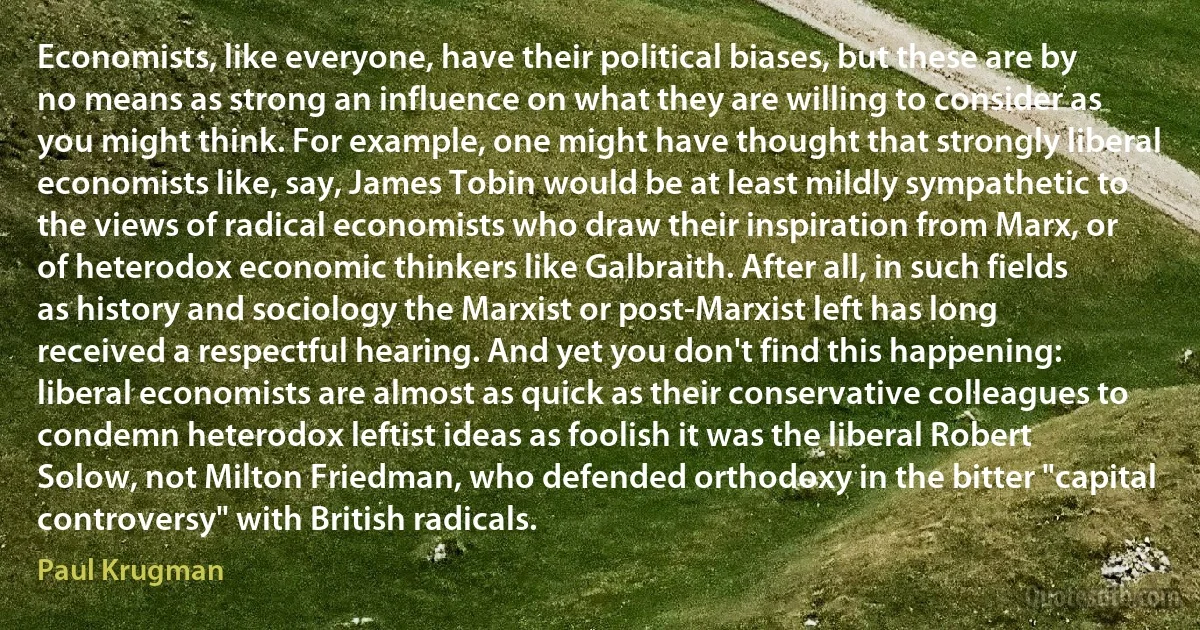
Economists, like everyone, have their political biases, but these are by no means as strong an influence on what they are willing to consider as you might think. For example, one might have thought that strongly liberal economists like, say, James Tobin would be at least mildly sympathetic to the views of radical economists who draw their inspiration from Marx, or of heterodox economic thinkers like Galbraith. After all, in such fields as history and sociology the Marxist or post-Marxist left has long received a respectful hearing. And yet you don't find this happening: liberal economists are almost as quick as their conservative colleagues to condemn heterodox leftist ideas as foolish it was the liberal Robert Solow, not Milton Friedman, who defended orthodoxy in the bitter "capital controversy" with British radicals.
Paul KrugmanRelated topics
almost bitter controversy draw everyone example find hearing history least left might orthodoxy quick say sociology thought think willing yet means marxist marx milton leftist friedman fieldsRelated quotes
General systems theory, in a sense, is no news at all, as Von Foerster found out when he attempted to organize a conference of general systems people and anthropologists. In a sense, the situation is comparable to that found by the Committee for the Study of Mankind, in which a committee that included Robert Redfidd tried to get each discipline to consider its relationship to the concept of Mankind. Anthropologists replied, "we are related already," and so they were. Something similar may be said of attempts to date in mathematical anthropology. The kind of information that a computer program can finally provide, on a level of a particular culture, is simply a reflection of how detailed field work has been done, and to the careful field worker, on kinship, for example, it provides no illumination.

Margaret Mead
Lord Jesus Christ, our foolish minds are weak; they are more than willing to be drawn-and there is so much that wants to draw us to itself. There is pleasure with its seductive power, the multiplicity with its bewildering distractions, the moment with its infatuating importance and the conceited laboriousness of busyness and the careless time-wasting of light-mindedness and the gloomy brooding of heavy-mindedness-all this will draw us away from ourselves to itself in order to deceive us. But you, who are truth, only you, our Savior and Redeemer, can truly draw a person to yourself, which you have promised to do-that you will draw all to yourself. Then may God grant that by repenting we may come to ourselves, so that you, according to your Word, can draw us to yourself-from on high, but through lowliness and abasement.

Søren Kierkegaard
In fact, the only person to rival Friedman for policy influence in the twentieth century is John Maynard Keynes, who had a strikingly different view of the role of government. Keynes was influential because he advocated more government intervention into what he perceived as poorly functioning private economies caught up in the Great Depression. In contrast to Keynes, Friedman put the main blame for the Depression on government failures, especially of monetary policy. Hence, the Depression did not make Friedman a fan of big government. He also found in the Federal Reserve's failure to prevent deflation an argument in favor of monetary rules. As the world evolved- with low inflation becoming the major mission of central banks and free markets and secure property rights becoming the main policies to promote economic growth-Friedman surely won the intellectual battle.

Robert Barro
The innovator, however, must in the first place be discontented, he must doubt the value of what he is doing or question the accepted ways of doing it. And secondly, he must be prepared to take fresh paths, to venture into fields where he is by no means expert. This is true, at least, of major forms of innovation; they make it possible for other men to be expert, but are not themselves forms of expertise. Freud was not an expert psycho-analyst; before Freud wrote there was no such thing; he created the standards by which psycho-analysts are judged expert. Neither was Marx an expert in interpreting history in economic terms nor Darwin an expert in evolutionary biology. If a man is trained, purely and simply, to be expert and contented in a particular task he will not innovate; Freud would have remained an anatomist, Marx a philosopher, Darwin a field-naturalist.

John Passmore
It does seem quite ironic to me that the very people who have made no attempt to think for themselves, are always the most vocal in demanding respect for their "ideas". But some Muslims go further than this and claim that they're being victimized in British society. But I don't really believe that's true. I do think a lot of people are getting fed up of hearing about Muslims all the time, and wish that Muslims would just shut up and get on with their lives, instead of constantly belly-aching about nothing, but that's not the same as being victimized. But because we live in a liberal democracy and therefore have certain double standards to maintain, any criticism of Islam or of Muslims always draws the immediate accusation of Islamophobia, a dishonest word which seeks to portray legitimate comment as some kind of hate crime.

Pat Condell
